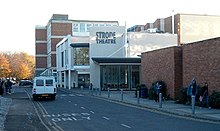
Street is a small town and civil parish in the county of Somerset, England. The 2011 census recorded the parish as having a population of 11,805. It is situated on a dry spot in the Somerset Levels, at the end of the Polden Hills, 2 miles (3.2 km) south-west of Glastonbury. There is evidence of Roman occupation. Much of the history of the village is dominated by Glastonbury Abbey until the Dissolution of the Monasteries, and a 12th-century causeway from Glastonbury was built to transport local Blue Lias stone from what is now Street to rebuild the Abbey.

An auditorium is a room built to enable an audience to hear and watch performances. For movie theatres, the number of auditoria is expressed as the number of screens. Auditoria can be found in entertainment venues, community halls, and theaters, and may be used for rehearsal, presentation, performing arts productions, or as a learning space.

The Queensland Performing Arts Centre is part of the Queensland Cultural Centre and is located on the corner of Melbourne Street and Grey Street in Brisbane's South Bank precinct.

A music venue is any location used for a concert or musical performance. Music venues range in size and location, from a small coffeehouse for folk music shows, an outdoor bandshell or bandstand or a concert hall to an indoor sports stadium. Typically, different types of venues host different genres of music. Opera houses, bandshells, and concert halls host classical music performances, whereas public houses ("pubs"), nightclubs, and discothèques offer music in contemporary genres, such as rock, dance, country, and pop.
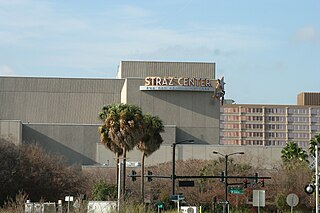
The David A. Straz Jr. Center for the Performing Arts opened its doors as the Tampa Bay Performing Arts Center, Tampa, Florida in July 1987. The venue was rebranded in November 2009 to recognize the donation of financier David A. Straz, Jr.--the largest individual philanthropic gift ever made to a cultural institution in Tampa.

The Krannert Center for the Performing Arts is an educational and performing arts complex located at 500 S. Goodwin Street in Urbana, Illinois, on the campus of the University of Illinois at Urbana-Champaign. Herman C. Krannert, an industrialist who was the founder of Inland Container Corp. and an alumnus of the University, and his wife, Ellnora Krannert, made a gift of $16 million that made creation of the Krannert Center possible. Max Abramovitz, the architect who designed the facility, was also an Illinois alumnus.

The Hexagon is a multi-purpose theatre and arts venue in Reading, Berkshire, England. Built in 1977 in the shape of an elongated hexagon, the theatre is operated by Reading Borough Council under the name "Reading Arts and Venues" along with South Street Arts Centre and Reading's concert hall.
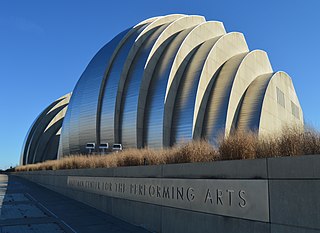
The Kauffman Center for the Performing Arts is a performing arts center in downtown Kansas City, Missouri, USA, at 16th and Broadway, near the Power & Light District, the Sprint Center and the Crossroads Arts District. Its construction was a major part of the ongoing redevelopment of downtown Kansas City.
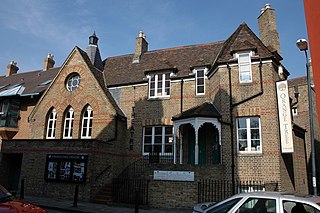
The Orange Tree Theatre is a 180-seat theatre at 1 Clarence Street, Richmond in south-west London, which was built specifically as a theatre in the round. It is housed within a disused 1867 primary school, built in Victorian Gothic style.

Aberystwyth Arts Centre is an arts centre in Wales, located on Aberystwyth University's Penglais campus. One of the largest in Wales, it comprises a theatre, concert hall, studio and cinema, as well as four gallery spaces and cafés, bars, and shops.
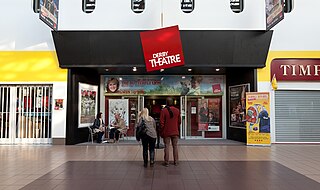
Derby Theatre is a theatre situated in Derby, England, located within the Derbion shopping centre. Formerly known as the Derby Playhouse, it was owned and run by Derby Playhouse Ltd from its opening in 1975 until 2008, when the company ceased operating after a period in administration. The theatre was reopened in 2009 as the Derby Theatre under the ownership of the University of Derby, who use it as a professional and learning theatre. In addition to the 531 seat main auditorium, the building contains a 110-seat studio theatre.

Somerset is a county in the south west of England. It has a varied cultural tradition ranging from the Arthurian legends to The Wurzels, a band specialising in Scrumpy and Western music.

The Clarice Smith Performing Arts Center is a performing arts complex on the campus of the University of Maryland, College Park. The 318,000-square-foot (29,500 m2) facility, which opened in 2001, houses six performance venues; the UM School of Music; and the UMD School of Theatre, Dance, and Performance Studies. It also houses the Michelle Smith Performing Arts Library. The Center operates under the auspices of the University of Maryland College of Arts and Humanities.

The Cockpit Theatre is a fringe theatre in Marylebone, London. Designed by Edward Mendelsohn and built in 1969-70 by the Inner London Education Authority (ILEA) as a community theatre, it is notable as London's first purpose-built Theatre in the round since the Great Fire of London. When ILEA was disbanded in 1990, ownership of the Cockpit was transferred to the London Borough of Westminster, who made it part of the newly renamed City of Westminster College. It remains one of a handful of purpose-built theatre training venues in the capital and is still owned and operated by the City Of Westminster College.

The Margot and Bill Winspear Opera House is an opera house located in the Arts District of downtown Dallas, Texas (USA).

The Greenock Arts Guild formed in 1946. Their Arts Guild Theatre on Campbell Street in Greenock, Scotland, held public performances from 1947 to 8 December 2012, then in January 2013 they opened the Beacon Arts Centre, a new building on Greenock's waterfront, adjacent to Customhouse Quay. Its main performance spaces are the Main Auditorium and The Studio theatre space. A Gallery Suite provides multifunction meeting, rehearsal and functions space, the "Bar + Kitchen" bistro café serves meals at lunchtime and before specific events. The Gallery Suite and the restaurant have full height glazed walls looking directly out over the River Clyde to the hills of Dunbartonshire and Argyll.

The Abbey Theatre is situated on Pool Bank Street in the Abbey Ward of Nuneaton, England, and is managed and run by a team of dedicated volunteers by the Nuneaton Arts Council (NAC)
Lancaster Arts at Lancaster University (LA) is Lancaster University's public arts organisation. The organisation presents performances, for the public, staff and students, through its campus venues the Nuffield Theatre, Lancaster Concerts Series and the Peter Scott Gallery.
The historic Capitol Theatre was built at 50 West 200 South in downtown Salt Lake City in 1913. Originally operated as a vaudeville house named Orpheum Theater, it was renamed Capitol Theater in 1927. It is also known currently as the JQ Lawson Capitol Theater. The building style is Italian Renaissance.
